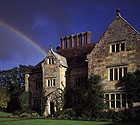Requiem for the Author of Frankenstein
Imagine Jane Austen penning this story: A handsome, rich baronet’s son is sent down from Oxford for political mischief. Undaunted, he writes poetry that must be circulated privately because of its seditious nature. He elopes with a woman of no fortune, and then abandons her to run away with another young woman of even less social standing—the daughter of disreputable radicals. Imagine the gossip, the indignation. He and his mistress are shunned by proper society, cut off from his fortune and all but the most rebellious of his cohorts. Almost penniless, they lose their first child at birth, but in spite of the scandal, remain defiantly together, and only months after their second child is born, travel to the continent to summer with the most notorious celebrity of the day.
Frankenstein was conceived during the summer of 1816 when Mary Godwin and Percy Bysshe Shelley lived on Lake Geneva in the company of the infamous Lord Byron. Frankenstein matured into a novel during the following winter, while Mary lived mostly without Shelley in Bath, keeping her pregnant stepsister Claire hidden from wagging tongues. During that winter both Mary’s half-sister, Fanny, and Shelley’s abandoned wife, Harriet, killed themselves. On January 1, 1818, one year later, Frankenstein descended upon the world. Its author, now the married Mrs. Shelley, was twenty years old.
Mary Shelley once said, “If philosophical novels were in fashion, we conceive an excellent one might be written on the development of the same mind in various stations, in different periods of the world’s history.” Anna Trevor, a young American woman has the kind of consciousness Mary Shelley must have foreseen. During waking hours Anna is preparing a controversial paper on Frankenstein, but when she sleeps, she falls into alarmingly realistic dreams of Mary Shelley’s life. In England, where Anna has come to present her paper, coincidence and synchronicity abound. As she experiences more and more of their world, Anna begins to believe that Mary Shelley and her legendary lovers, Percy Bysshe Shelley and Lord Byron, exist as consciously creative beings sharing time and space—and mind—with her.
Are Anna’s dreams active, transformative, “real” experiences capable of influencing both the present and the past? Is this a ghost story? A historical fiction? A tale of mystical encounters in a state of consciousness where all time is present time? Requiem offers an impeccably researched portrait of the brilliance and daring of the author of Frankenstein. It is a tribute, a "philosophical novel" that seeks to embrace the zeitgeist of Mary Shelley’s day, a symbolic recovery of the creative genius of the feminine. Requiem for the Author of Frankenstein is literary fiction that, like its namesake, rides the thin edge between the rational and the irrational, transporting its readers into the 19th century world of Britain's famed Romantics.
A Word About Place
Molly traveled to England, Italy, Switzerland, and France researching Requiem for the Author of Frankenstein. Her novel emerged out of the land, the architecture, and the artifacts of the past.
"I did a lot of traveling and spent a lot of time creating the world my novel lives in. The most consistent feedback I’ve received from readers is that reading Requiem is like falling into another world. I believe stories like Mary Shelley’s live in the earth, that they can be mined out of the energies that surround the places where she spent time—like a psychic residue, a collective memory. I believe we all leave a trail behind us, but that the bigger the person’s impact, the more potent the trail. I came to know Mary by spending time in the remnants of her world.
My settings, even for the contemporary character Anna, are all based on real places that I found in my travels and real experiences I had in those places. For example, the old estate with its cellar that’s been sealed for three quarters of a century—there is such a place in England, a B&B where I stayed. The place felt haunted and I had a peculiar experience that led to a conversation with the owners. They were not surprised. They believed the place was haunted, and were, I think, a little afraid of their own cellar. In Requiem, this becomes Manesbrook Manor, Auntie Frances’s abandoned B&B and a doorway to much of Anna's contact with the past."
Manesbrook Manor
